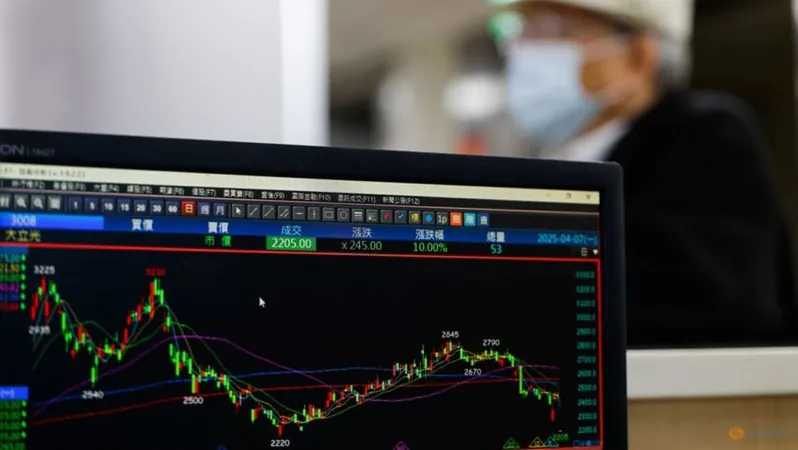
Taiwan Stock Market Crashes as Tariff Fears Spark Panic Selling – What’s Next?
2025-04-07
Author: Yu
In a dramatic fall, Taiwan’s stock market plunged nearly 10% on Monday, marking its first trading day since U.S. President Donald Trump introduced new import tariffs last week. This sudden downturn has led the head of Taiwan's stock exchange to announce that additional stabilisation measures may be implemented if market volatility continues.
After a two-day trading hiatus, the benchmark index opened on Monday at its lowest point in over a year. It faced the largest single-day percentage decline since at least 1990, according to data from LSEG. "The panic selling pressure is extremely high," noted Venson Tsai, an analyst from Cathay Futures in Taipei, highlighting the prevalent crisis of market confidence.
In an effort to mitigate potential market disruption due to the tariffs, Taiwan's top financial regulator confirmed temporary short-selling curbs that will be in place throughout the week. These measures aim to bolster investor confidence amidst fears of escalating trades tensions.
Prominent companies such as chip manufacturer TSMC and electronics giant Foxconn witnessed their stock prices tumble nearly 10%, activating the market's 10% circuit breaker rule to halt trading temporarily. While semiconductors are not directly affected by Trump’s tariffs, Taiwan’s economy remains heavily reliant on its role within the global electronics supply chain, impacting sectors from smartphones to automobiles.
Notably, Taiwan was highlighted by Trump as a trading partner with one of the largest trade surpluses in the U.S., subsequently facing a hefty 32% duty on certain imports. In response to these tariffs, Taiwan announced a significant support package worth T$88 billion (approximately $2.65 billion) aimed at assisting affected companies. President Lai Ching-te further expressed ambitions to boost trade and investment with the United States, pushing for a future where zero tariffs could be established between the two economies.
Taiwan Stock Exchange Chairman Sherman Lin affirmed that they would work closely with the financial regulator to deploy necessary stabilisation strategies throughout the week. He acknowledged the challenges ahead, stating that it would be difficult for Taiwan to avoid impacts from the tariffs, but urged investors to retain their confidence in the robustness of Taiwanese companies and government initiatives.
Moreover, Allen Huang, vice president at Mega Financial’s securities investment unit, warned that the likelihood of a recession could exceed 50% under current conditions, expressing doubt that Trump would amend his trade policies anytime soon.
In a negative turn for investor sentiment, Goldman Sachs downgraded Taiwan to "underweight" in its Asian market allocations, attributing this move to the nation’s high dependence on U.S. exports and sensitivity to market fluctuations.
As the situation develops, investors are left wondering: How will Taiwan navigate this economic storm, and what will be the long-term effects of these tariffs? Stay tuned for updates as we continue to monitor the unfolding drama in Taiwan’s stock market!
(Note: $1 = 33.2020 Taiwan dollars)


 Brasil (PT)
Brasil (PT)
 Canada (EN)
Canada (EN)
 Chile (ES)
Chile (ES)
 Česko (CS)
Česko (CS)
 대한민국 (KO)
대한민국 (KO)
 España (ES)
España (ES)
 France (FR)
France (FR)
 Hong Kong (EN)
Hong Kong (EN)
 Italia (IT)
Italia (IT)
 日本 (JA)
日本 (JA)
 Magyarország (HU)
Magyarország (HU)
 Norge (NO)
Norge (NO)
 Polska (PL)
Polska (PL)
 Schweiz (DE)
Schweiz (DE)
 Singapore (EN)
Singapore (EN)
 Sverige (SV)
Sverige (SV)
 Suomi (FI)
Suomi (FI)
 Türkiye (TR)
Türkiye (TR)
 الإمارات العربية المتحدة (AR)
الإمارات العربية المتحدة (AR)